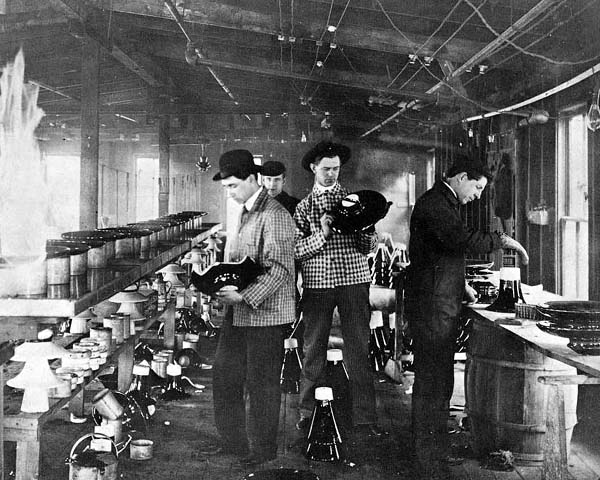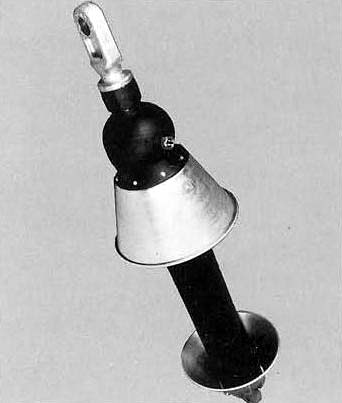 |
| A youthful Arthur Austin ( centre foreground) putting ideas into practice in 1905. (From Decca Navigator News , June 1979) |
The company, founded in 1933, and acquired by Decca in 1970, manufacturers a range of products which set a world standard for quality and reliability.Arthur Austin, founder of the insulator company, A. O. Austin Inc., graduated from Leland Stanford University in 1903 and in that same year was sent east by the Pacific Gas & Electric Co, as an insulator inspector. He became intensely interested in insulator design and manufacture and was given permission to carry out experimental work of his own, making his own molds and tools; experimenting not only with new designs of his own, but with better ways to produce them en masse.
In 1906 he left PG & E to work for the Lima Insulator Company. In 1908, when this factory was destroyed by fire, he left and went to work for the Ohio Brass Company, Barberton, Ohio, in the insulator division.
 |
| A youthful Arthur Austin ( centre foreground) putting ideas into practice in 1905. (From Decca Navigator News , June 1979) |
The first of A. O. Austin's 225 different patents was awarded in January 1910. This was for a basic ball socket connection for suspension insulators. In 1933, Arthur Austin left Ohio Brass to start his own insulator manufacturing business in Barberton, Ohio, manufacturing radio tower insulators and related equipment. It
to was A. O. Austin's insistence on top quality insulators that was responsible for much of Ohio Brass's success in the business and is the reason why A. O. Austin Inc. subsequently led the field in the manufacture of ultra reliable radio insulators and lighting ball transformers.The Decca Navigator Company became interested in Austin insulators in 1946 when the English Chain of stations was being built. The four self supporting towers were each erected on four Austin oil filled base insulators. Since that time, many hundreds of Austin insulators have been used on Decca transmitting aerials throughout the world. The largest Decca masts, erected to date - those for the Dectra stations in Scotland and Newfoundland - used Austin base and guy insulators.
A. O. Austin designed the first radio mast lighting transformers incorporating the torrid winding principle and using a comparatively long air gap for RF insulation. For higher voltages, a similar transformer is used immersed in insulating oil. These along with their complete range of guy strain and base insulators and the ultra reliability
factor built into all Austin products made their products ideally suited to the needs of the Decca Navigator stations being installed around the globe. At one time it was a popular belief that, with the opening up of higher and higher radio frequencies, there would be less demand for space in the lower frequency bands but this has not been the case. The MF, LF and VLF portions of the spectrum are more crowded today than ever before and many stations are pushing up their power to the extent that megawatt and higher power transmitters are by no means uncommon.In 1970, Decca purchased A. O. Austin Inc together with its name and moved it lock, stock and barrel from Barbeton, Ohio to its present location in Brampton, Ontario. The range of products and their volume has been greatly increased since that time. This can be attributed to the single minded devotion of Lionel Dennett, General Manager of Decca Austin Insulators supported by Ted Thompson, Chief Engineer; Bill Chamberlain, Sales Manager; Pat Warr, Avionics and Main Chain; and John Molloy-Vickers, International Sales Manager.
Decca with its global marketing organization is now in a most favourable position to capture a major portion of the radio insulator business in the world market; especially when you consider that the research and development teams of the Decca group are better equipped than any other company in the world to institute any technological advances that may be necessary to meet the challenge of the constantly more sophisticated state of the art.
 |
| This Austin guy wire insulator was used in the Decca chains. (From Decca Navigator News , June 1979) |
Back to Decca Transmitters
Aug 7/12